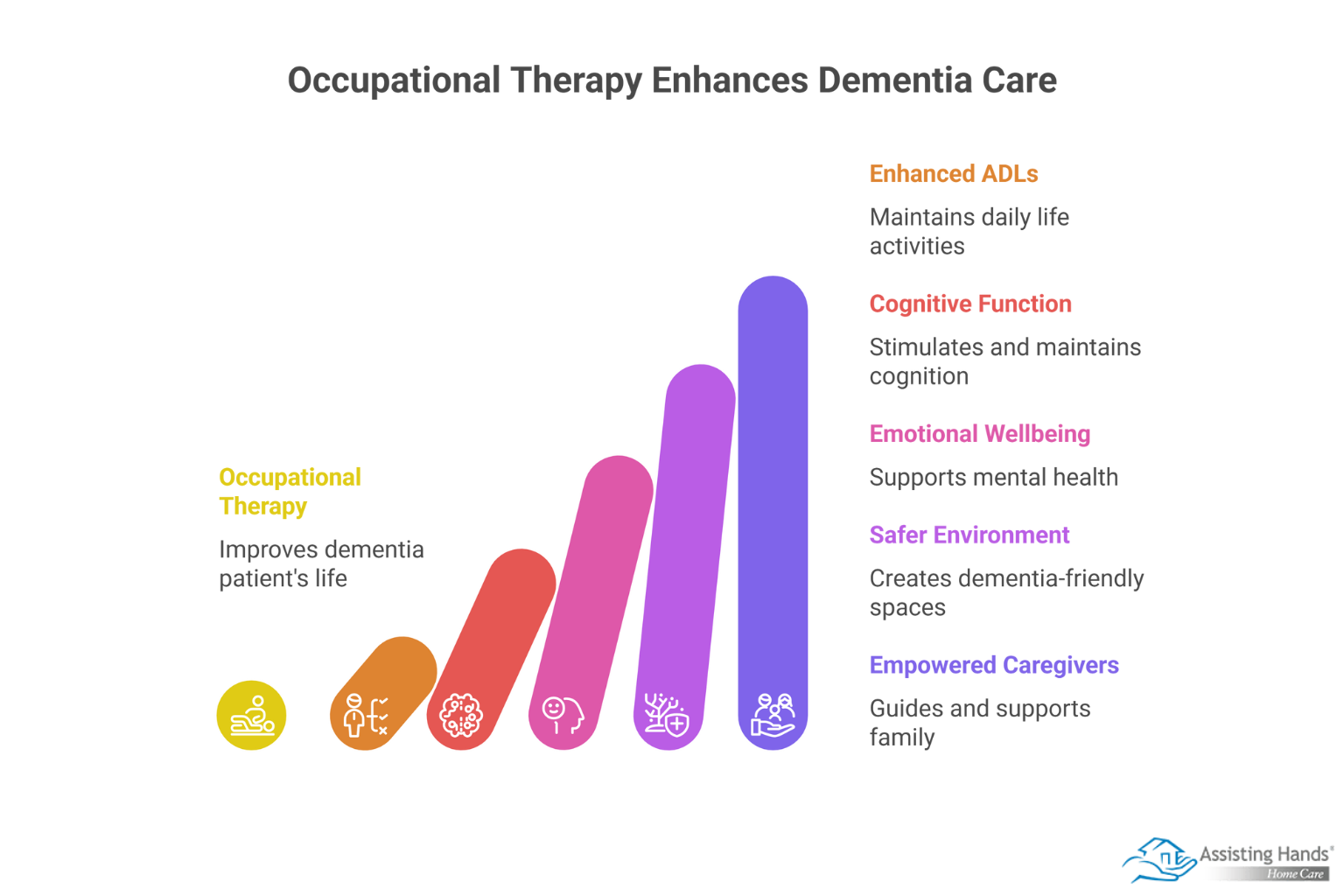
Table of Content
Caring for a senior loved one with dementia involves navigating a complex set of challenges, from memory loss to difficulties with daily functions. Occupational therapy (OT) plays an integral role in addressing these challenges, offering tools and strategies to enhance quality of life for both individuals with dementia and their caregivers. Below, we explore the impact and applications of occupational therapy in dementia care.
Enhances Daily Life Activities
One of the key goals of occupational therapy in dementia management is helping individuals maintain their ability to perform daily life activities for as long as possible. These activities, referred to as activities of daily living (ADLs), include tasks such as dressing, eating, and grooming.
- Task simplification
Occupational therapists often break down complex tasks into smaller, more manageable steps. For instance, instead of instructing your loved one to get dressed, an occupational therapist might guide him or her through putting on a single piece of clothing at a time.
- Adaptive equipment
Tools such as modified utensils, clothing with Velcro closures, and grab bars in the bathroom can make daily tasks more accessible and less frustrating.
With these strategies, your loved one can remain engaged and preserve his or her independence for as long as possible.
There are a variety of age-related health conditions that can make it more challenging for seniors to live independently. However, many of the challenges they face can be easier to address if their families opt for professional home care service. You can rely on expertly trained caregivers to keep your loved one safe and comfortable while aging in place.

Maintains Cognitive Function
Occupational therapy goes beyond physical tasks to address cognitive challenges commonly associated with dementia. Therapists work to stimulate and maintain cognitive function through targeted activities designed to engage the mind.
- Memory aids
Tools such as labeled cupboards, visual reminders, and digital alarms reduce confusion by reinforcing routines.
- Cognitive exercises
Activities like puzzles, memory games, and word association tasks are tailored to fit the individual’s cognitive ability, promoting mental sharpness and reducing anxiety.
These efforts, while they don’t cure dementia, may slow the decline of cognitive abilities and enhance day-to-day experiences.
If you have a senior loved one who needs help maintaining a high quality of life while aging in place, reach out to Assisting Hands Home Care, a leading provider of home care Columbia families can trust. Our caregivers help seniors focus on healthy lifestyle habits such as eating nutritious foods, exercising regularly, and maintaining strong social ties, and we offer mentally stimulating activities that can boost cognitive health and delay the progress of dementia.
Supports Emotional Wellbeing
Dementia can take a toll on mental health, often leaving individuals feeling isolated, anxious, or frustrated. Occupational therapy can play a key role in supporting emotional wellbeing and boosting self-esteem.
- Engaging in meaningful activities
Occupational therapists can identify enjoyable and meaningful activities for your loved one, such as gardening, painting, or listening to music, which foster a sense of accomplishment.
- Stress management techniques
Therapists might introduce breathing exercises, gentle physical activity, or mindfulness techniques to manage agitation and anxiety.
By focusing on emotional care, occupational therapy helps individuals with dementia maintain a positive outlook, boosting their overall quality of life.
Creates a Dementia-Friendly Environment
The environment plays a significant role in dementia management, as cluttered or chaotic spaces can increase confusion and agitation. Occupational therapists work closely with caregivers to create safer, more dementia-friendly living spaces.
- Better layouts
Therapists can recommend clear pathways, prominent signage, and minimal clutter to help your loved one better navigate his or her surroundings.
- Safety modifications
Suggestions such as using nonslip mats, removing tripping hazards, and installing proper lighting ensure a safer living environment.
A well-designed environment can reduce accidents and make daily living less stressful for everyone involved.
Empowers Caregivers and Family Members
Occupational therapy doesn’t just support the individual with dementia. It also empowers caregivers and family members. Therapists offer valuable guidance and tools to make caregiving responsibilities more manageable.
- Caregiver training
Occupational therapists teach caregivers how to use adaptive techniques and communicate effectively with their loved ones.
- Stress reduction
Caregivers are introduced to ways they can manage their own stress while providing care, such as adopting realistic expectations and seeking support when needed.
Equipping caregivers with these skills creates a more collaborative and supportive environment, benefiting both seniors with dementia and their support networks.
Aging in place can present a few challenges for seniors living with dementia. However, they can still live independently at home with the help of professional dementia care. Columbia families can rely on Assisting Hands Home Care to provide their elderly loved ones with mental and social stimulation, timely medication reminders, assistance with meal prep, and much more. Our caregivers are available around the clock to help your loved one live a happier and healthier life. To learn more about our reliable, compassionate in-home care services, contact us today.







